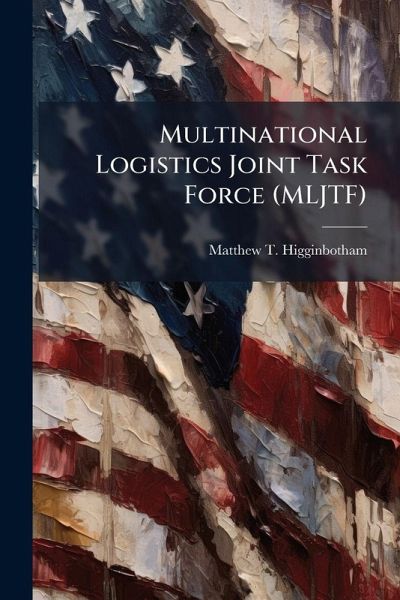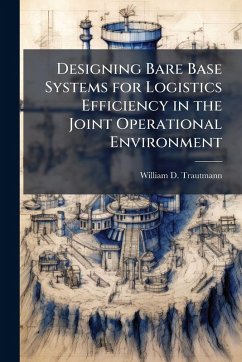
Multinational Logistics Joint Task Force (MLJTF)
Versandkostenfrei!
Versandfertig in über 4 Wochen
16,99 €
inkl. MwSt.
Weitere Ausgaben:

PAYBACK Punkte
8 °P sammeln!
Currently the United States is involved in providing logistics support to multinational stability operations around the world. Synchronizing support to US and coalition forces not only requires planners to integrate the different strategic, operational and tactical logistics doctrine of each participant, but to determine the optimal logistics organizations required to support multinational operations. The complexities of integrating US joint and multinational logistics support to stability operations in the absence of a fixed, US multinational logistics organization remains a significant chall...
Currently the United States is involved in providing logistics support to multinational stability operations around the world. Synchronizing support to US and coalition forces not only requires planners to integrate the different strategic, operational and tactical logistics doctrine of each participant, but to determine the optimal logistics organizations required to support multinational operations. The complexities of integrating US joint and multinational logistics support to stability operations in the absence of a fixed, US multinational logistics organization remains a significant challenge for logistics planners. This difference in stability operations logistics doctrine is due to many factors, but primarily to national constraints of logistics authority, which impact logistics planning and the CJTF commander's ability to achieve unity of effort across logistics in the Joint Area of Operations (JOA). Therefore, assuming there are no changes to multinational stability operations logistics doctrine in the near future, how does a US CJTF commander best integrate joint and multinational logistics operations for future US lead stability operations? In this monograph, by analyzing the UN, NATO and the US Army's evolving Modular Logistics Doctrine, the author integrates the key areas from each doctrine into a multinational logistics joint task force (MLJTF) organization. The MLJTF is a separate logistics joint task force whose commander reports to the CJTF commander, and is responsible for executing, synchronizing, and coordinating theater logistics during a given stability operation. By analyzing UN, NATO and future US modular logistics doctrine, the author concludes that, regardless of current US title 10 and coalition national authority constraints, commanders and logisticians must organize the optimal logistics organization that provides the CJTF commander a clear picture of logistics in his JOA. Properly resourced with joint and multinational resources, the M This work has been selected by scholars as being culturally important, and is part of the knowledge base of civilization as we know it. This work was reproduced from the original artifact, and remains as true to the original work as possible. Therefore, you will see the original copyright references, library stamps (as most of these works have been housed in our most important libraries around the world), and other notations in the work. This work is in the public domain in the United States of America, and possibly other nations. Within the United States, you may freely copy and distribute this work, as no entity (individual or corporate) has a copyright on the body of the work. As a reproduction of a historical artifact, this work may contain missing or blurred pages, poor pictures, errant marks, etc. Scholars believe, and we concur, that this work is important enough to be preserved, reproduced, and made generally available to the public. We appreciate your support of the preservation process, and thank you for being an important part of keeping this knowledge alive and relevant.












